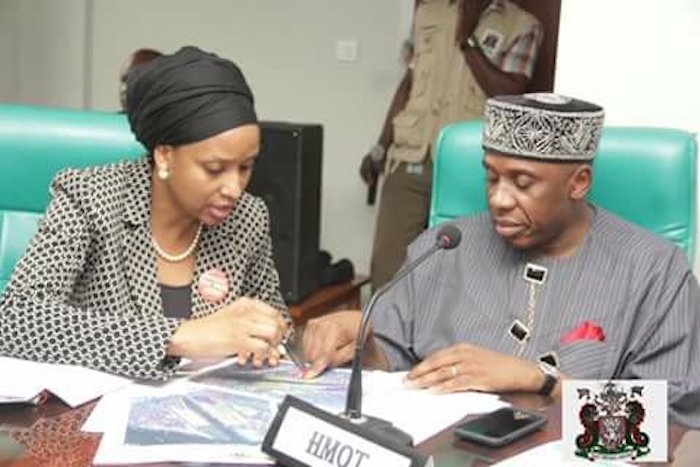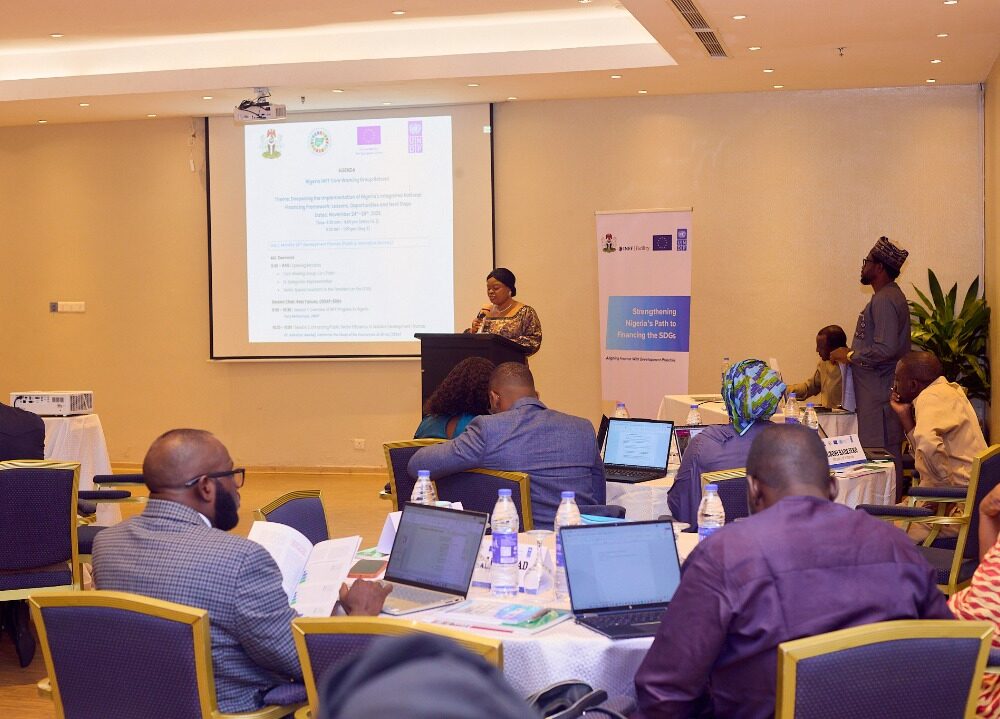When people quit offices, it’s apposite that they reflect on their encounters, experiences of their tenures; the gains and pains, challenges and solutions that worked and those that failed while they held sway.
It is generally believed that such detailed accounts help the society in multi-dimensional ways and such authors appear more fulfilled not only with the achievements recorded in those offices, but because of the new insights they have provided which could be of immense help to those coming behind.
It is in that context I am convinced that former Managing Director of the Nigerian Ports Authority, Hadiza Bala-Usman has essayed producing her new book, “Stepping on Toes: My Odyssey at the Nigerian Ports Authority”.
But before I return to this book, it’s content and the controversies it is expected to ignite, let me say that post-tenure publications are as old as publishing itself and that the world is not in short supply of books which leaders, popular and notorious, had blessed the coming generations with, in attempts to give their stewardships.
From The White House, the seat of power of the American governments, has emerged many of such books which are still relevant on the bookshelves all over the world.
You must have seen A Full Life: Reflections at 90 by Jimmy Carter; An American Life by Ronald Reagan; Memoirs: Years of Decision by Harry Truman; White House Years: Mandate for Change by Dwight Eisenhower; A Time to Heal by Gerald Ford; and much more recent ones such as Bill Clinton’s My Life; and A Promised Land by Barrack Obama.
Indeed, dutiful First Ladies have not been left out of the race to document for posterity, events that hallmarked their offices with one of the most recent being Michelle Obama’s The Light We Carry or The Downing Street Years by Margaret Thatcher and Dare Not Linger: The Presidential Years by Nelson Mandela?
In Nigeria, My Watch by former President Olusegun Obasanjo stands out as perhaps most revealing and (of course, infuriating for some) out-of-office memoir given the wide conflicts with many especially those who worked in or around his government after the release of the book.
Let us also not forget that out-of-office memoirs are always controversial with peppering accounts that leave some of the concerned dramatis personae at the receiving ends of damning revelations and claims. If you are in doubt, check how Obasanjo took his Vice, Atiku Abubakar, to the pillory as a “shameless liar,” “a corrupt man,” and one who is not fit to hold public office in My Watch.
Till date, Obasanjo’s portrayal of Atiku has continued to hunt him till the very last presidential election where his alleged skeletons in Obasanjo’s presentation continued to be held against him.
Don’t forget that till date, Obasanjo’s allegations against one of the Nigerian civil war time Generals, Alabi Isama, have left the duo permanently embittered with no signs for reconciliation till they will both will submit themselves to their Creator.
Chief Bisi Akande, in his book, My Participations, had raised dust in no small volume when he descended on his estranged deputy, Iyiola Omisore, when he wrote that, “Iyiola Omisore crept into my life like a silent malignant cancer. He came in full force. In a few months, I thought I knew him. I regret I did not know him in his true colours.”
Akande’s book became much more stirring given the time of its release and coupled with the fact that few months after, both the author and Omisore would be at the same table pushing for the victory of the then Osun Governor, Alhaji Gboyega Oyetola and eventually that of President-Elect, Bola Tinubu. Many wondered how Akande would have felt, compelled to work with a man he had so viciously devoured with that one injuring phrase, a “malignant cancer.”
Now back to Hadiza Bala-Usman’s book. By her pedigree, the former NPA boss isn’t expected to be frivolous. She is believed to be well-homed in the radical creed of her father’s revolutionary fervour; a radical academic and historian who died a fighter for social justice and good governance.
Of course, the story out there was that Hadiza was booted out over NPA’s’s non-remittance of about N165bn operating surpluses into the Consolidated Revenue Fund Account of the Federation 6. That sounded good alibi under an administration that claims to be fighting sleaze. But one would also have expected the investigations to have been much more thorough enough to end in a logical note for the rest of us to know where that money ended up.
But Hadiza claims in her book that the above was mere subterfuge to get rid of her by Amaechi as retaliation for her unyielding stance on some issues bordering on transparency and allied matters. That is what my boss and a leading columnist, Azubuike Ishiekwene has described as “stepping on the toes of a big man.”
Indeed, one of the aides of the former Minister even insinuated that the manuscripts of Hadiza’s book was still in the works and that the lines which made their ways into the newsrooms on Tuesday April 11, were haphazardly arranged to meet the particular target of boxing Amaechi in the face as part of the do-me-I-do-you edging and elbowing that are ongoing in the All Progressive Congress, especially as party stalwarts gather for the all-important butchering and sharing of the big booty of the 2023 general elections.
And why would that surprise anyone following keenly the politricks of the APC gladiators as the party winds down President Muhammadu’s eight years tenure? Didn’t you hear Amaechi’s damning revelation when he said that the Independent National Electoral Commission Chairman, Prof Mahmood Yakubu, and the police had conspired against Nigerians and that Mahmood could not have been an unbiased umpire given the trajectory of his journey to becoming the boss of INEC.
But Hadiza Bala-Usman’s book and the hoopla it will, no doubt generate, are not the only intentions of this piece. It is to essay a guess into the shape of things to come post-Muhammadu Buhari administration given the deals, counter-deals and other under-the-table fixings that are sure to have gone on in the eight years of the administration.
For an administration that rode to office on the credibility of its head’s perceived transparency dossier, should Nigerians expect a post-Buhari era of scandalous revelations, sleazy things where appointees’ hands have been dirtied, with hair-splitting facts? We may be close to a time when damning documents would be released to the public in torrents to show that the anti-corruption mantra has been, after all, a mere facade.
I have been told that Amaechi has been advised by his lawyers not to respond to Hadiza until he sees the entire publication. It then means that what is to come from the accused either proves Hadiza to be a liar or confirms that Amaechi was on a mission, very ignoble.
Was it not an interesting coincidence that the controversial book hit the town the same week Nigerians were asking questions how 12 airport fire trucks were procured at the cost of N12bn? Those who have raised the alarm claimed that similar equipment is displayed for far lesser costs in some other places demanding why Nigeria’s own versions would be this astronomically prohibitive.
But in what appeared like whipping up sentiments rather than explaining the reasons for the cost, the Minister, Hadi Sirika, had launched into lamentations how the absence of such fire trucks was the reasons parents watched their children burn into ashes when the Sosoliso Airplane came down in Port Harcourt some years back. I think Sirika needs to face the issues of the figure and not remind us of the tragedy that claimed those angels in the ill-fated Sosoliso airline crash.
Will the post-Buhari era tell Nigerians the whole truth whether Sirika’s ministry’s hands were clean in the fire trucks deal? We wait!
Under some ministers, serving and former heads of parastatals have tales to tell and there are possibilities of such endless narratives once the supervising ministers are out of their current positions on May 29.
I am aware of a Minister who unceremonious eased out the head of one of the agencies under his supervision over something like Hadiza’s claims in her book. Someday, that agency head who preferred to leave than submit himself to the alleged humiliating experience his minister-boss preferred would tell Nigerians what truly transpired.
As a matter of fact, I am aware that the said minister had made attempts to ‘use’ the Economic and Financial Crimes Commission and the Independent Corrupt Practices and Other Offences Commission (ICPC) to hype some corruption allegations against the said agency head but realised his victim was read to open to the public and spill everything forcing the minister to beat a retreat.
For instance, what was the true story behind the removal of Damilola Ogunbiyi of the Rural Electrification Agency and Marilyn Amobi, of the Nigerian Bulk Electricity Trading Company by the Minister of Power, Sale Mamman?
Many of these removals were carried out without recourse to the Federal Government’s directive on modalities for sanctioning or removing heads of agencies by supervising ministers as laid down.
I recall vividly that the Federal Government FG had insulated appointees against such arbitrariness with a circular which was made public in 2020. Yet, some of the removals sailed through without consequences. Did President Buhari ask questions when some agency heads were yanked off?
With “Stepping on Toes” by Hadiza Bala-Usman, even in the twilight of the Buhari administration, she may have watered the grounds for the shape of revelations to come any time after May 29.
•Okanlawon, Communications and Strategy Advisor, is publisher of NPO Reports and can be reached on sokanlawon67@gmail.comwhile he tweets via @sokanlawon





